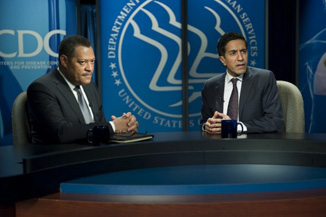Movie Review: Contagion
By Matthew Huntley
September 14, 2011
If you view Contagion purely as a thriller, and not as an in-depth socio-political commentary, then it serves as solid entertainment. It’s tense, well-acted and the story doesn’t stray too far from credibility. Although its subject matter is serious, this is not a “serious film,” because it mostly operates within the confines of a glossy Hollywood production that’s keener on showing off its cast and bowing down to contrived sentimentalism and traditional thriller tactics than deconstructing what it’s really about. It functions more like an engaging page-turn than an analytical study on a world health crisis. These aren’t necessarily bad things, and we mostly eat them up, but it might be wrong to think we should see Contagion as anything more than simple escapism.
It’s fitting the director is Steven Soderbergh, who specializes in stories about disparate characters all linked by a common narrative thread. This one is about a deadly virus outbreak that starts in one city and spreads across the entire world in less than half a year. It begins on “Day 2,” when a traveling marketing manager, Beth Emhoff (Gwyneth Paltrow), takes a call from her extra-marital lover in Chicago. She’s just cheated on her husband, Mitch (Matt Damon), and is about to head home to Minneapolis to see him and her son. At an airport bar, she coughs, shows feverish symptoms and a couple days later succumbs to a fatal seizure. There are other cases like her, including ones in Japan, from where Beth has just returned; London; and China.
Officials at the Center for Disease Control and World Health Organization aren’t sure what to make of the novel disease, including Dr. Ellis Cheever (Laurence Fishburne) and the doctor he hires to investigate and manage the situation, Dr. Erin Mears (Kate Winslet). There’s also an epidemiologist, Dr. Leonara Orantes (Marion Cotillard), researching everything and everyone Emhoff came into contact with so she can determine its cause. She concludes, as does Mears, that the virus is spread by touching, and Soderbergh doesn’t skimp on shots of everything we touch on a daily basis - cell phones; elevator buttons; credits cards; drinking glasses; and especially our own faces, which, according to Mears, we touch two or three thousand times a day. Seeing these images made me want to wash my hands and never touch anything again, which is one of the ways the movie creates an effective state of unease.
On the political side of the spectrum is a free-lance writer from San Francisco, Alan Krumwiede (Jude Law). He’s one of those left-wing, bike-riding bloggers who vehemently speaks out against (and believes in) things like corporate malfeasance and government conspiracy. When the disease sets in and becomes a reality, he’s convinced the CDC and WHO are in bed with pharmaceutical companies and deliberately wait on distributing a cure until assured profits can be made. As more people die, his views add widespread panic to the ensuing violence and chaos as the grim realities of a dog-eat-dog world begin to show their ugly heads.
The story of Contagion is nothing new to the movies. We’ve seen others like it before (The Andromeda Strain, Outbreak), but what it sets it apart is Soderbergh’s gift for realism and making everything seem relatively believable. His best films - Sex Lies and Videotape, Traffic, Bubble - contain characters who don’t necessarily act a certain way because the plot requires them to, but because that’s how people would really behave in their situations. This allows us to respond and become invested in them. Given the premise of Contagion, which is wrought but compelling, it’s hard for the characters’ dialogue and actions not to feel scripted, but Soderbergh lends them a certain level of authenticity. Aside from its final act, the movie doesn’t get bogged down in all the usual developments we’ve come expect from the genre, which was refreshing.
Speaking of the last act, it boils down to a series of moralistic and emotional payoffs that make sure each of the characters finds redemption and peace of mind. This wrapped everything up too nicely and was probably less a creative decision by the filmmakers and more a choice by studio executives who wanted to ensure a happy ending that tied up all the loose ends. This includes the final scene, which answers one of the movie’s last burning questions. In hindsight, I didn’t want to know it, especially after Scott Z. Burns’ screenplay made a point of saying there are just some things that doctors, scientists and medical professionals don’t know. I think if the movie had found a way to end on that theme, it would have made the experience more thoughtful as a whole.
Still, the storytelling is slick and the actors are convincing. Together they involve us in the plot, which, although derivative, is coherent and engaging. In the hands of a lesser director and cast, Contagion might have been a television movie of the week, but Soderbergh’s style elevates it to something grander and more significant. Unlike the director’s best work, it won’t leave you thinking long and hard about what you just saw, but it’ll leave you entertained.
|
|
|
|




